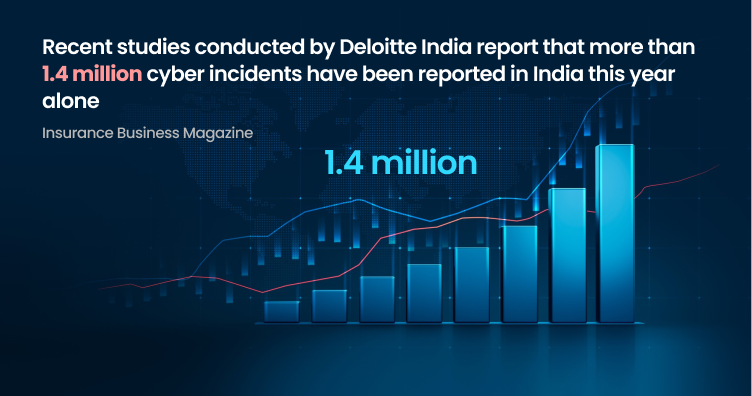“The question is no longer if a company will face a cyberattack but when,” said Anand Venkatraman, Partner, Risk Advisory at Deloitte India. This reality is increasingly being grasped by the growing number of companies, particularly in India, for having superior cybersecurity. Despite the great strides that have been taken in the realm of security technology, every system is flawed. This has driven many firms—corporate security firms, among them—to find an antidote in the form of cyber insurance.

The growth rate of the cyber insurance market in India is relatively high. Presently, it is valued at USD 50-60 million and maybe around USD 3.5 billion in 2032, with a CAGR of 27-30%(Deloitte United States, IMARC). With emerging cyber threats through different means, cybersecurity companies are not only “defenders of digital infrastructures” but also prime targets themselves. This paradox makes cyber insurance an indispensable part of their risk management toolkit.
Why Cybersecurity Firms Need Cyber Insurance
Most cyber threats come to cybersecurity firms. Their roles encompass protecting companies from attackers, vulnerability analysis, and limiting breaches. Yet, they are not exempt from the same threats they are attempting to neutralize.
-
- Complex Client Responsibilities: Cybersecurity firms handle sensitive information from their clients. In case of a breach, the firm can be held legally liable for any damage caused, thereby causing the loss of sensitive data. Without cyber insurance, the firm faces heavy financial damages.
- Evolving Threats: The dangers of cyber threats become much more rapidly than most security technologies do. Be it ransomware or a phishing attack, the next day brings new challenges. So, effective breaching causes reputational damage to cybersecurity firms as much as any other can; they are counted upon as protectors of data and infrastructure.
- Third-Party Risks: The defenses of third-party vendors and their software providers can be weaknesses, even for the firm with the most robust internal cybersecurity defenses. Usually, these external risks remain unnoticed and result in severe damage when they emerge.
Cybersecurity companies deal with sensitive information and are at the edge of cyberattacks against businesses. At the same time, this vulnerability creates a sweet spot for hackers to steal from these huge vats of data. Even the best-protected in the industry remain at risk from direct attacks and third-party vulnerabilities, as in the cases of FireEye and SolarWinds.
Without cyber insurance as a safety net, the companies may face heavy financial loss, legal liabilities, and reputational damage in case of any breach.
Real-life Case Study: The Effects of Cyber Attacks on Security Companies
Case Study 1: The FireEye breach, 2020
In late December 2020, FireEye realized it had fallen victim to a sophisticated attack from a nation-state. Hackers had entered the firm’s systems and stolen the Red Team tools that the company used to simulate cyberattacks on its clients’ systems. This made the firm’s clients even more vulnerable because hackers could use them against other organizations.
FireEye’s response was swift and organized, but cyber insurance could have played a very pivotal role in reducing this financial fallout. How is that?
1. Incident response costs:
Most cyber insurance packages include incident response services, which include forensic analysis to determine the scope of a breach and possible consequences. FireEye’s internal response was very robust, but insurance would have bettered the extra financial comfort in the cost related to the deployment of third-party forensic experts.
2. Legal Expenses:
After the compromise, FireEye might have faced numerous legal issues on its clients’ side, scared of their security being breached. Cyber insurance will cover the legal costs of defending the likely lawsuit or fines resulting from a breach issue. Such wars are costly to a cybersecurity company, and insurance is crucial in legally managing the risk.
3. Business Interruption:
The theft of FireEye’s tools would disrupt its business operations. Cyber insurance can cover the lost income caused by such interruptions, helping the firm recover financially while managing the breach. This is very important for cybersecurity firms, where clients may have stopped services due to concerns regarding trust and security.
4. Reputation Management:
FireEye would have to regain its integrity after the breach. Cyber insurance would take care of PR and reputation management, helping FireEye resolve all issues that its clients may face, regain their trust, and regain the public image.
FireEye reacted quickly and mitigated the breach’s impact at large; however, cyber insurance could have provided further relief in terms of the financial burden it incurred and, subsequently, the resources needed to deal with the complex complexities of having been attacked by such a sophisticated threat agent.

Key Coverage Areas in Cyber Insurance for Cybersecurity Firms
Cyber insurance policies for cybersecurity firms cover all risks that may threaten them. Here are some of the coverage areas to consider when a cybersecurity firm chooses a policy:
- Data breach costs include notifications to clients about a data breach and credit monitoring services provided to affected clients.
- Legal and Regulatory Costs: Cybersecurity firms will have to bear the costs of liability based on claims raised by clients or regulatory bodies due to data breaches. Cyber insurance covers the defense costs and penalties asserted by regulatory authorities.
- Business Interruption: If a cyber attack severely disrupts the operations of a cybersecurity firm, for example, cyber insurance can cover the loss of income and any supplementary costs incurred to resume their business.
- Ransomware Attacks: Ransomware is the fastest-growing cyber threat globally. Cyber insurance policies can cover ransom payments and costs incurred in negotiations with hackers, as well as the retrieval of encrypted data.
- Reputation Management: Successful cyberattacks severely damage reputations, particularly those of cybersecurity firms. Cyber insurance policies can also help public relations rebuild the firm’s reputation and clients’ confidence.
- Third-Party Liability: The majority of cybersecurity companies involve third parties and partners. In the event of a breach due to third-party vulnerability, this firm will also be liable. Cyber insurance covers third-party risk.
Cyber Insurance in India: Emerging Market

Indian cyber insurance is rapidly emerging due to growing cyber threats and increased recognition of cyber insurance as a vital component of risk management. Recent studies conducted by Deloitte India report that more than 1.4 million cyber incidents have been reported in India this year alone (Insurance Business Magazine). As the number of incidents rises, so will the number of companies looking for cyber insurance coverage and, more importantly, cybersecurity firms.
Furthermore, India’s increased sector digitization and expansion of its BFSI, healthcare, IT, and retail industries continuously drive the demand for cyber insurance forward. Moreover, the adoption of 2023 of the DPDP Act serves as another catalyst for organizations to shift their attention to cybersecurity and acquire cyber insurance coverage to complement this strategy of compliance(IMARC).
DPDP Act and Cyber Insurance
The DPDP Act has been a very strong catalyst for the cyber insurance market in India. The act demands stiffer data protection measures at the business level and then accountability of organizations in the event of data breaches. Given this, cyber insurance is becoming an essential element in helping companies comply with new regulation requirements.
Most of all, firms involved in cybersecurity must protect not just their clients but also their businesses from the monetary fines inflicted by regulators. Failure may be due to non-compliance with data protection law, and the heaviest fines can be imposed. Such fines may be afforded by way of an insurance policy.
Things to look for when selecting a cyber policy
Cyber insurance is very essential to a cybersecurity company. The considerations to be observed are as follows:
- Tailored Coverage: Coverage tailored to Cybersecurity companies is not the same as the rest. The selected coverage must specifically include the risks associated with security professionals. This is where policy limits are evaluated against the actual potential losses that are likely to be incurred. Cyber mishaps are pricey to recover from, and the right amount of cover will protect against those kinds of losses.
- Exclusions: Every cyber insurance policy has exclusions. Knowing what is not covered is valuable. The most common ones include nation-state attacks and terrorist acts.
- Incident Response Support: A number of the more advanced cyber insurance policies also offer up incident response teams that help manage a cyber incident and thereby reduce the impact of the breach. This is very valuable to a cybersecurity firm whose incident is active.
Mitigata: Cyber Insurance Leaders Partner with Cybersecurity Providers

At Mitigata, we understand the unique complexities associated with cybersecurity firms. Thus, we bring together huge experience and strong industry knowledge with a flexible approach to effective underwriting-tailored policies that respond to the needs of businesses within the cybersecurity business. With solutions ranging from breach costs to legal fees, business interruption, and the like, Mitigata gives cybersecurity firms peace of mind while focusing on what matters most: securing clients from cyber dangers.
Our team actively collaborates with cybersecurity firms to assess their risk profiles and develop solutions that provide the greatest protection at competitive prices. As the Indian cyber insurance market grows, Mitigata stays ahead by providing cutting-edge insurance products geared toward adapting to new threats. If you are a cybersecurity outfit looking to protect your operations from risk, Mitigata is your best ally. Take your time; contact us today to learn more about our extensive cyber insurance policies and how we can help you stay protected in this increasingly hostile digital world.
Cyber insurance is no longer a luxury but a must for cybersecurity firms in India. The risks are too high, and the stakes are too high. That is when having the right insurance policy gives cybersecurity firms much confidence in driving through the cyber world of these threats, no matter how sophisticated they may be. Let’s get in touch with Mitigata to help you out.

